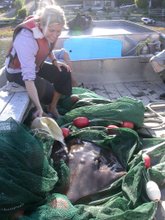The stranding of juvenile salmon sharks is a common occurrence in summer months along the w
 est coast of Vancouver Island. Since 2005 we have received ten separate reports of juvenile salmon sharks strandings ranging from the Juan de Fuca trail to Chesterman’s beach in Tofino. We usually receive at least one salmon shark stranding report per year, but in 2007 a total of four separate stranding were reported. This salmon shark stranding is the first report we received this year.
est coast of Vancouver Island. Since 2005 we have received ten separate reports of juvenile salmon sharks strandings ranging from the Juan de Fuca trail to Chesterman’s beach in Tofino. We usually receive at least one salmon shark stranding report per year, but in 2007 a total of four separate stranding were reported. This salmon shark stranding is the first report we received this year.So the question you’re probably asking is why do sharks strand themselves? There is no single definitive answer, but a range of hypotheses that have been put forward. Some of these hypotheses include a sudden change in water temperature, stormy ocean conditions, disease, ingestion of flotsam (garbage), or pursing prey. Another interesting comparison discusses the possibility of local geomagnetic signatures confusing the navigational abilities of sharks (check out this link for further discussion http://www.elasmo-research.org/education/topics/b_strandings.htm). A final noteworthy item is that live shark strandings are usually recorded for juveniles; juvenile salmon sharks along the Pacific Northeast and juvenile whale sharks along South African coasts. Perhaps inexperience or poorly developed navigational abilities may also contribute to these strandings. In the end it is still a mystery and shark biologists around the world continue to study this phenomenon and hope to find more definite answers.
If you have any shark or skate sightings to report we would love to hear from you. You can email us at shark_reports_bc@yahoo.ca.








